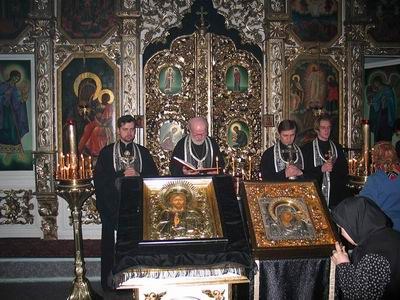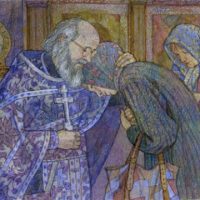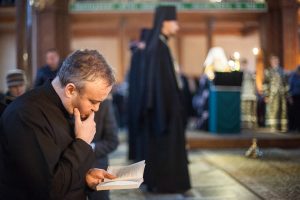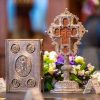Matthew 6 (RSV):
14 For if you forgive men their trespasses, your heavenly Father also will forgive you;
15 but if you do not forgive men their trespasses, neither will your Father forgive your trespasses.
* * *
In the Name of the Father, Son, and Holy Spirit!
Dear brothers, sisters, and children in Christ,
Tomorrow we enter the holy days of Great Lent, and the Church calls us to ask forgiveness of one another with repentance and humility in our hearts. We will enter a holy place and time. The fast is not a weight loss diet, nor is it a socio-economic necessity. The fast is a sacrament of our earthly life.
Not satisfied with the generous fruit of the Garden of Eden, Adam had to till the desert of his soul through the sweat of his brow, irrigating it with repentant tears, yet only receiving weeds and thorns for his labor (Genesis 3:17-18). Having lost the sweetness of Paradise, Adam had to taste the bitterness of the fast in order to return to his Father’s house- now not only as the image of God, but also His likeness. The fast of not a punishment for a crime, but a salvific medicine that helps cure the illness of sin and rid one of dependency on passions.

The seventy day period of the Lenten Triodion from the week of the publican and Pharisee to Great Saturday reminds us of the seventy years that Israel spent in Babylonian captivity (Jeremiah 25:11). Since they had forgotten God and bowed down to strange idols, the Hebrew people brought repentance and tears to irrigate the desert of their souls while on the banks of the rivers of Babylon (Psalm 136:1), remembering the glory of Jerusalem as Adam had once remembered the sweetness of lost paradise. Could it be that for a similar falling away from the will of God, the Russian people had to suffer under the yoke of communism for seventy long years?
The forty days of Great Lent should remind us of the forty-year-long journey of Israel through the wilderness before it was granted to see the Promised Land (Num. 32:13). In the same way, we must cross the barren wilderness of our withered souls on the way to Holy Pascha. And just like ancient Israel in the wilderness (Ex. 16:35), we must learn to put our trust not in ourselves but completely in God, Who nourishes us with His Gifts.
Lent is our path to God, our sacrifice; and like any sacrifice it must be brought by clean hands and with a humble and contrite heart (Ps. 51:17). The Savior, teaching the Jews who brought their sacrifices in accordance with the Law of Moses, said that a man who brought his sacrifice to the Holy Altar but did not reconcile with his brother, must leave his sacrifice, go and reconcile with his brother, and only then return and approach the sacrament (Matt. 5:22-24). How much more must we who approach New Testament Sacraments heed the words of Christ! Today, for the last time before Great Lent begins, the Holy Church calls on her children to approach the sacrament, having first asked forgiveness and reconciled with each other. She urges us to prefigure the joyous Paschal greeting with the repentant greeting of Forgiveness Sunday.
It is only possible to offer an acceptable sacrifice to God with a pure heart, and only through humble forgiveness one can be truly repentant. Without forgiveness, one can only cold-heartedly recite a list of sins found in the prayer book. Because only he who can forgive can also accept forgiveness from his brother and from God.
Forgiveness is not the same as finding excuses for the actions of another. Making up excuses for the actions of another person is not forgiveness, but judgment, thinly veiled with a search for “mitigating circumstances.” Such a man looks for excuses for his own sins as well; he is sure of his “righteousness” and is not able to accept God’s forgiveness and healing.
Forgiveness is a humble realization of the fact that according to our sins we deserve the worst punishment and death itself, while He, Whom we tirelessly crucify with our sins, “has done nothing wrong” (Luke 23:41). The medicine that treats our sinful wounds and ills may be bitter and therapy may be unpleasant, but let us in humility thank God for His salvific care for us. Our heavenly Father is not forsaking us, dying in the depths of our passions, but offering us salvation, calling us to repentance, and awaiting our conversion. Let us accept His sacred healing with thanksgiving, let us forgive each other with humility, ask forgiveness in repentance, and act with love and kindness toward one another.
Amen!
* * *
The Rite of Forgiveness:
The Cross and the icons of our Savior and the Theotokos are brought out and placed on the stands on the ambo. The Rector makes prostrations and venerates the Cross and the icons. Then he turns to the people and asks for their forgiveness, saying: “Bless me, holy fathers and brothers, and forgive me, a sinner, the sins that I have committed this day and in all the days of my life, whether in word, deed, or thought, and with all my senses.” Having said this, he bows to the ground before the people. Everyone responds to him with bowing to the ground and says: “God will forgive you, holy father. Forgive us, sinners, and bless.” The priest replies: “With His Grace, may God forgive us and have mercy on us.” Then the Rector takes the Cross. All the clergy in order and by their ranks venerate the icons, kiss the Cross and each other, and ask forgiveness. Following them come the lay people, venerating the Cross and the icons held by the clergy, and kissing each other, asking forgiveness of the clergy and of each other.



















